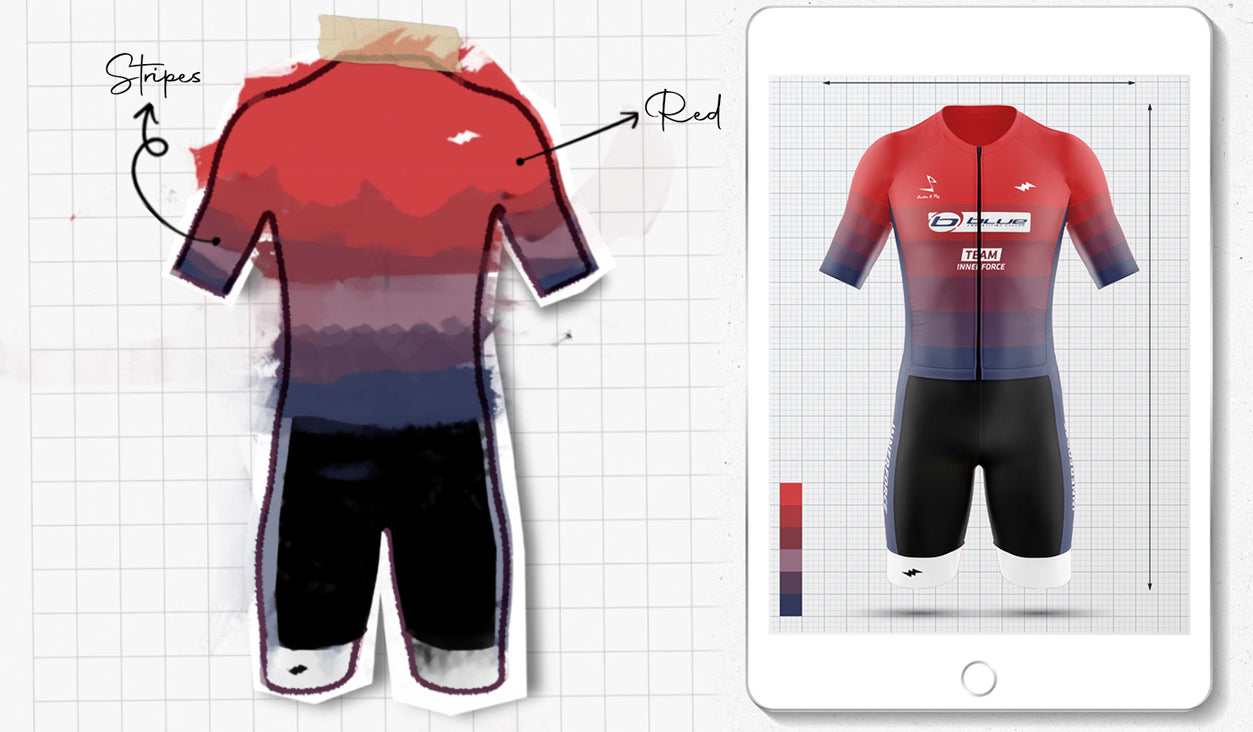5 Tips for Regaining Motivation For Triathlon Training

Triathletes are often seen as superhuman fitness freaks who are willing to brave the cold and wet to go out at 5am every day and train. The moniker ‘Ironman’ has probably had a lot to do with this perception of an unbreakable strength of mind and body. But the truth is that we are not unbreakable; we suffer from lack of motivation just like everyone else. Let’s open the discussion on motivation, rather than shying away from it, so that we can understand what is going on and how we can use this knowledge to regain motivation for triathlon training.
Firstly, if you are suffering from low motivation for triathlon training then understand that you are not alone; we’ve all been there at some point. Some ways in which you can regain that lost motivation are by setting a goal that is a bit scary, tell your friends all about it, do it for charity, train as a group and look through your old photos.
Set A Scary Goal
There is nothing quite like the feeling of pushing the ‘submit’ button for an event that you are not really sure you can complete. It will give you an immediate feeling of fear and anxiety that will get you off of your couch and into your training gear.
When looking at new goals, don’t limit yourself to triathlons. Looking outside the immediate area of triathlons you can find something novel that will really excite you. A 30km trail run, a 100-mile bike ride, or a 10km marathon swim might be just what you need to get you out of your comfort zone. You will also meet a whole bunch of new people that will love to hear about triathlons and you can let their enthusiasm get you stoked again.
Keep in mind that the goal you set should not be so crazy that you cannot achieve it. If you can only run 10km at the moment, then a 100km trail run would probably not be a great target. If you look around and find an event that you think you only have a 50% chance of completing if you tried today, then that is probably the one to go for.
When should you not push through low motivation – listen to your body, maybe you need to rest, is this low motivation constant? Is it paired with an injury? Are you overloading with other parts of your life?
What to do if you take a break – time to look again at the training program (80/20?), look at your nutrition, and look at your goals.
Tell Your Friends About It

Making yourself accountable is a great way to keep motivated through the difficult times. If nobody knows that you just signed up to a massive endurance challenge then it doesn’t really matter as much if you don’t follow through with it. By telling your friends about your goals you make yourself more accountable, especially if you share your training program with them and ask them to check your progress each week.
An interesting piece of information on sharing your goals is that it is really important who you tell. A recent study has shown that the benefits of sharing your goals with others is greatest when you tell someone who you feel has a higher status than yourself. Participants felt the need to ‘prove themselves’ more to a person that they had more respect for and so strived harder to achieve their self-chosen goals. For us, this means telling someone that we feel is a stronger athlete than us. Telling your Mom is sweet, but she’s unlikely to chastise you for failing in your training efforts. Your marathon-running friend, however, you will want to prove yourself to, so you’re less likely to skip a training session.
Do It For Charity
Intrinsic motivation is one way of getting your mojo back, but if you are really struggling then why not do it for someone less fortunate. When you realize how many people out there have it a lot worse than us, your lack of motivation for training becomes insignificant. Training for something that is bigger than you is a sure-fire way to get you out there training.
Active.com are just one of the sites that has a page for charitable endurance events, or just get in touch with a local charity that you care about and see what you can do to help others.
Train As A Group

While there are some key benefits to solo training, getting yourself into a group is another great way to add some accountability to your training. The knowledge that others are relying on you means that, even when you are feeling lethargy creeping in, you do not want to let people down.
Multiple Ironman event winner Lucy Gossage is a proponent of team training, stating that the shared experience of training together makes the sessions seem easier. Be sure to find people that are at a similar level as you, or just a touch higher so that they will push you to become better.
Another thing worth noting is that you do not need to do all of your training as a group. If you are seeking some solitude then by all means go for a solo run, but for those long bike rides it may be worth having some company to ease the boredom.
Look Through Your Old Photos
Our memories get hazy over time, and we may start to question why we are even dedicating so much of our time to training. One way to remind yourself is to look back through your old photos, dust off your finisher medals and relive the experiences again. Playing back old achievements with the use of some pictures will bring the positive feelings flooding back and might be just the spark you need to get training again.
When Should You Not Push Through Low Motivation?

A majority of the time, low motivation may well just be that; a lack of hunger that needs reigniting. Other times low motivation may be something quite different that you should pay heed to. Your mind is a powerful tool and your low motivation may be a sign that your body needs a break. If this is the case then it would be wise to listen to your feelings.
Check your life outside of triathlon. Are you working more hours than normal? Are you going through family troubles that require attention? Are you not able to get 8 hours sleep each night because you are training too much? If your low motivation to train is coupled with any of the above then it is probably time to listen to your inner voice and re-evaluate what is possible, if not then you could be opening yourself up for injury.
Final Thoughts
Lacking the motivation to train is natural and it is OK. At some point we all go through low points, and understanding that it will pass is key to success. Analyse why it is that you are lacking motivation. If you are simply overloaded with other commitments then make the necessary adjustments, and this may mean no training for a while.
If it really is a case of ‘can’t-be-bothered-itis’, then use some of the tips suggested to get you feeling the stoke again. Check out your local events and sign up to one; once you have committed to an event it is surprising how the motivation will come back, especially if you tell everyone about it!
Written for Innerforce by Stewart Spiessens
Photos. @natiavanheerden

Triathletes are often seen as superhuman fitness freaks who are willing to brave the cold and wet to go out at 5am every day and train. The moniker ‘Ironman’ has probably had a lot to do with this perception of an unbreakable strength of mind and body. But the truth is that we are not unbreakable; we suffer from lack of motivation just like everyone else. Let’s open the discussion on motivation, rather than shying away from it, so that we can understand what is going on and how we can use this knowledge to regain motivation for triathlon training.
Firstly, if you are suffering from low motivation for triathlon training then understand that you are not alone; we’ve all been there at some point. Some ways in which you can regain that lost motivation are by setting a goal that is a bit scary, tell your friends all about it, do it for charity, train as a group and look through your old photos.
Set A Scary Goal
There is nothing quite like the feeling of pushing the ‘submit’ button for an event that you are not really sure you can complete. It will give you an immediate feeling of fear and anxiety that will get you off of your couch and into your training gear.
When looking at new goals, don’t limit yourself to triathlons. Looking outside the immediate area of triathlons you can find something novel that will really excite you. A 30km trail run, a 100-mile bike ride, or a 10km marathon swim might be just what you need to get you out of your comfort zone. You will also meet a whole bunch of new people that will love to hear about triathlons and you can let their enthusiasm get you stoked again.
Keep in mind that the goal you set should not be so crazy that you cannot achieve it. If you can only run 10km at the moment, then a 100km trail run would probably not be a great target. If you look around and find an event that you think you only have a 50% chance of completing if you tried today, then that is probably the one to go for.
When should you not push through low motivation – listen to your body, maybe you need to rest, is this low motivation constant? Is it paired with an injury? Are you overloading with other parts of your life?
What to do if you take a break – time to look again at the training program (80/20?), look at your nutrition, and look at your goals.
Tell Your Friends About It

Making yourself accountable is a great way to keep motivated through the difficult times. If nobody knows that you just signed up to a massive endurance challenge then it doesn’t really matter as much if you don’t follow through with it. By telling your friends about your goals you make yourself more accountable, especially if you share your training program with them and ask them to check your progress each week.
An interesting piece of information on sharing your goals is that it is really important who you tell. A recent study has shown that the benefits of sharing your goals with others is greatest when you tell someone who you feel has a higher status than yourself. Participants felt the need to ‘prove themselves’ more to a person that they had more respect for and so strived harder to achieve their self-chosen goals. For us, this means telling someone that we feel is a stronger athlete than us. Telling your Mom is sweet, but she’s unlikely to chastise you for failing in your training efforts. Your marathon-running friend, however, you will want to prove yourself to, so you’re less likely to skip a training session.
Do It For Charity
Intrinsic motivation is one way of getting your mojo back, but if you are really struggling then why not do it for someone less fortunate. When you realize how many people out there have it a lot worse than us, your lack of motivation for training becomes insignificant. Training for something that is bigger than you is a sure-fire way to get you out there training.
Active.com are just one of the sites that has a page for charitable endurance events, or just get in touch with a local charity that you care about and see what you can do to help others.
Train As A Group

While there are some key benefits to solo training, getting yourself into a group is another great way to add some accountability to your training. The knowledge that others are relying on you means that, even when you are feeling lethargy creeping in, you do not want to let people down.
Multiple Ironman event winner Lucy Gossage is a proponent of team training, stating that the shared experience of training together makes the sessions seem easier. Be sure to find people that are at a similar level as you, or just a touch higher so that they will push you to become better.
Another thing worth noting is that you do not need to do all of your training as a group. If you are seeking some solitude then by all means go for a solo run, but for those long bike rides it may be worth having some company to ease the boredom.
Look Through Your Old Photos
Our memories get hazy over time, and we may start to question why we are even dedicating so much of our time to training. One way to remind yourself is to look back through your old photos, dust off your finisher medals and relive the experiences again. Playing back old achievements with the use of some pictures will bring the positive feelings flooding back and might be just the spark you need to get training again.
When Should You Not Push Through Low Motivation?

A majority of the time, low motivation may well just be that; a lack of hunger that needs reigniting. Other times low motivation may be something quite different that you should pay heed to. Your mind is a powerful tool and your low motivation may be a sign that your body needs a break. If this is the case then it would be wise to listen to your feelings.
Check your life outside of triathlon. Are you working more hours than normal? Are you going through family troubles that require attention? Are you not able to get 8 hours sleep each night because you are training too much? If your low motivation to train is coupled with any of the above then it is probably time to listen to your inner voice and re-evaluate what is possible, if not then you could be opening yourself up for injury.
Final Thoughts
Lacking the motivation to train is natural and it is OK. At some point we all go through low points, and understanding that it will pass is key to success. Analyse why it is that you are lacking motivation. If you are simply overloaded with other commitments then make the necessary adjustments, and this may mean no training for a while.
If it really is a case of ‘can’t-be-bothered-itis’, then use some of the tips suggested to get you feeling the stoke again. Check out your local events and sign up to one; once you have committed to an event it is surprising how the motivation will come back, especially if you tell everyone about it!
Written for Innerforce by Stewart Spiessens
Photos. @natiavanheerden
SEE WHAT CUSTOM APPAREL LOOKS LIKE

GEAR UP
MORE FROM THE BLOG

Becoming Climate Neutral Certified: Our Journey
For sure, you might have heard about climate change, global warming, and all the external factors that have an impact...

Our Alliance With The American Foundation for Suicide Prevention
Social impact can be defined as the net effect of an activity on a community and individuals and families’ well-being....

We Believe In The Power of Sports
For us, “sport” does not mean only achieving the gold medal nor being better than anyone else. Sport means challenging yourself...

Our logo explained: how we built our new brand identity
Our journey began in 2018 when we were just getting to connect with our market with essential and basic communication....



